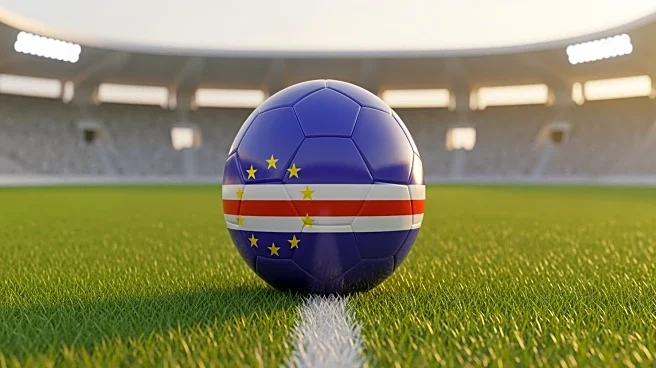What's Happening?
Cabo Verde, a small island nation in the Atlantic Ocean, has made history by qualifying for the 2026 FIFA World Cup for the first time. The national team, known as the Blue Sharks, secured their spot with a decisive 3-0 victory over Eswatini on October 13, 2025. This win allowed them to maintain an unassailable lead in CAF Group D. The Blue Sharks have been recognized for their underdog story, having defeated larger teams such as Cameroon in a 1-0 upset on September 9, 2025. The team, governed by the Cabo Verdean Football Federation, was established in 1982 and has been affiliated with FIFA since 1986. Their journey to the World Cup has been marked by strategic recruitment from the Cape Verdean diaspora and a focus on disciplined defense and counter-attacks.
Why It's Important?
Cabo Verde's qualification for the World Cup is significant as it represents a major achievement for a nation with a population of just over 500,000. This milestone highlights the potential for smaller nations to compete on the global stage, challenging traditional powerhouses in international soccer. The Blue Sharks' success could inspire other small countries to invest in their sports programs and pursue international recognition. Additionally, this achievement may boost national pride and unity within Cabo Verde, as well as increase interest and investment in soccer across the region.
What's Next?
As Cabo Verde prepares for the 2026 FIFA World Cup, the team will likely focus on further developing their strategies and integrating young talent to ensure competitive performance on the world stage. The qualification may lead to increased support from sponsors and the government, providing resources for training and infrastructure improvements. The team will also need to navigate the challenges of competing against more experienced and well-funded teams, requiring careful planning and execution of their game strategies.
Beyond the Headlines
Cabo Verde's journey to the World Cup underscores the importance of strategic planning and community engagement in sports development. The team's success is a testament to the power of leveraging diaspora connections and fostering local talent. This achievement may also prompt discussions on the role of sports in national identity and international diplomacy, as Cabo Verde gains visibility and recognition through its participation in the World Cup.








